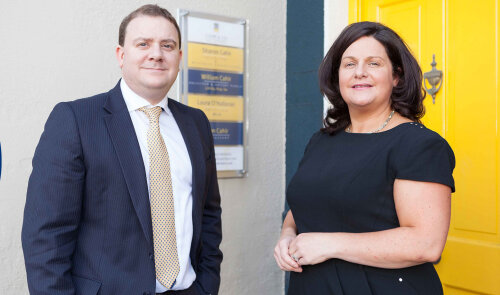Best Commercial Real Estate Lawyers in Ennis
Share your needs with us, get contacted by law firms.
Free. Takes 2 min.
Free Guide to Hiring a Real Estate Lawyer
List of the best lawyers in Ennis, Ireland
About Commercial Real Estate Law in Ennis, Ireland
Commercial real estate in Ennis covers a wide range of property types - retail units, offices, industrial premises, hotels, restaurants and mixed-use developments. Ennis is the county town of County Clare and is subject to local planning, zoning and rate systems operated by Clare County Council. The legal work that surrounds commercial property transactions combines conveyancing, landlord and tenant law, planning and development law, environmental and building regulation compliance, and commercial contract law. Whether you are buying, selling, leasing, financing or developing commercial property in Ennis, legal advice is essential to identify risks, secure clear title, and ensure compliance with statutory requirements.
Why You May Need a Lawyer
Commercial real estate transactions are complex and have long-term financial implications. You may need a lawyer in the following common situations:
- Buying or selling commercial property - to handle title searches, contracts, tax and registration steps.
- Negotiating or drafting commercial leases - to protect your interests on rent, repairs, break clauses, assignment and liability.
- Financing or refinancing - to prepare and register security documents such as legal charges and to negotiate lender terms.
- Development projects - to advise on planning permission, development levies, conditions and appeals.
- Due diligence and risk assessment - to investigate planning history, restrictions, easements, environmental liabilities, and third-party rights.
- Dispute resolution - to address landlord-tenant disputes, contract breaches, boundary or nuisance claims, or enforcement of remedies.
- Compliance with building regulations and health and safety obligations - to reduce the risk of enforcement or liability.
- Structuring investments - to advise on ownership entities, joint ventures, and tax consequences relevant to commercial property.
Local Laws Overview
This section summarises key legal areas and local systems that are particularly relevant in Ennis and County Clare. This is a plain-language overview and not legal advice.
- Planning and Zoning - Clare County Council administers the local development plan and planning applications for Ennis. The Planning and Development Acts set out how permissions are granted, conditions applied and appeals handled by An Bord Pleanala. Change of use and significant alterations to commercial premises usually require planning permission.
- Property Registration - The Property Registration Authority (PRA) operates the Land Registry and Registry of Deeds systems. Clear title and proper registration of transfers, leases and charges are critical to secure ownership and priorities.
- Landlord and Tenant Law - Commercial leases are mainly governed by contract law, established cases and specific statutory provisions. Key commercial lease issues include rent review, repairs and maintenance obligations, service charges, tenant fit-out, assignment and subletting restrictions, and break clauses.
- Building and Fire Regulations - Building control regulations and local authority building control officers enforce compliance with building standards and fire safety. Works often require building control notifications and certificates on completion.
- Environmental Regulation - Potentially contaminated land, waste permits or other environmental licences can affect commercial sites. The Environmental Protection Agency and local authorities oversee environmental standards and enforcement.
- Rates and Local Charges - Non-domestic rates are levied by Clare County Council on commercial properties. Rates affect operating costs and should be checked as part of due diligence.
- Taxes and Duties - Stamp duty applies on transfers of commercial land and certain leases. Income tax, corporation tax, VAT and capital gains tax can also arise depending on the transaction. Revenue rules and rates change periodically, so specialist tax advice is recommended.
- Compulsory Purchase and Development Contributions - Local authorities have powers to acquire land for public projects. Development levies and contributions can apply to new developments under local policies.
Frequently Asked Questions
How do I buy a commercial property in Ennis?
Start with a clear budget and financing plan. Instruct a solicitor experienced in commercial conveyancing. Carry out due diligence - title searches at the Land Registry, planning history, environmental checks, and physical surveys. Negotiate heads of terms, agree contract conditions, pay deposits, and complete legal formalities such as stamp duty and registration of title. Your solicitor will manage contract exchange and completion and ensure registration of the transfer or charge with the PRA.
Do I need planning permission to change the use of a property?
Often yes. Change of use from one class to another can require planning permission under the Planning and Development Acts. Some minor changes may be exempt or may benefit from permitted development, but you should check with Clare County Council or a planning solicitor before starting works or changing use.
What checks should I do before signing a commercial lease?
Key checks include confirming the landlord has good title to lease, understanding the lease term and break clauses, rent review mechanism, repair and insurance obligations, service charge liability, restrictions on assignment and subletting, permitted uses and any planning or licence conditions. Also check for underground or third-party rights, and obtain any necessary consents for intended use.
Who pays for stamp duty and when is it due?
Stamp duty is generally payable by the purchaser on the transfer of commercial property, and may also apply to certain lease premiums and long leases. The duty must be stamped within the timeframe set by Revenue to secure the document and avoid penalties. Rates and rules change, so confirm current levels with your solicitor or tax adviser.
What are non-domestic rates and how are they calculated?
Non-domestic rates - often called commercial rates - are payable to Clare County Council and are based on the valuation of the property by the Valuation Office. The council sets the rate in the euro per valuation unit. Rates are an ongoing operating cost for commercial property owners and occupants and should be factored into budgeting.
How long does a typical commercial property sale or lease transaction take?
Timescales vary. A straightforward purchase with clear title might complete in 6 to 12 weeks after heads of terms are agreed. More complex deals - involving planning issues, environmental concerns, or finance - can take several months. Lease negotiations can also vary from a few weeks to months depending on complexity and required consents.
What is a title report and why is it important?
A title report, prepared by your solicitor, explains who legally owns the property, any mortgages, charges or encumbrances, easements, covenants, and any restrictions on the land. It identifies title risks so you can decide whether to proceed, seek indemnities, or require the seller to resolve defects before completion.
Do I need an environmental report or survey?
Yes - environmental due diligence is important for many commercial sites, especially industrial land or premises with a history of potentially contaminating uses. A Phase 1 environmental site assessment can identify risks; if concerns arise, a Phase 2 investigation may be required. Environmental liabilities can be costly and sometimes hidden, so do not skip these checks.
What happens if a tenant breaches their lease?
Remedies depend on the lease terms. Common responses include serving notices to remedy the breach, claiming damages, forfeiture for non-payment of rent or serious breaches, or seeking court orders for specific performance or possession. Legal advice is essential to follow correct procedures and protect enforcement rights.
How do I choose the right solicitor for commercial real estate work in Ennis?
Look for a solicitor with specific commercial property experience, good local knowledge of Clare and Ennis, clear fees and billing practices, and references from businesses or investors. Confirm they handle the specific type of transaction you need - conveyancing, leases, development work or dispute resolution - and that they will coordinate with surveyors, tax advisers and lenders as required.
Additional Resources
Useful organisations and bodies to consult or contact when dealing with commercial real estate in Ennis include:
- Clare County Council - for planning, building control, local development plans and commercial rates.
- Property Registration Authority - for Land Registry and Registry of Deeds searches and registrations.
- Revenue Commissioners - for information on stamp duty, VAT and tax implications of property transactions.
- Valuation Office - for valuation queries relating to non-domestic rates.
- Environmental Protection Agency - for environmental regulatory guidance and licensing where relevant.
- Law Society of Ireland - to find and verify solicitors who practise commercial property law.
- Society of Chartered Surveyors Ireland - for professional surveyors and valuers experienced in commercial property.
- Health and Safety Authority - for workplace safety obligations in commercial premises.
Next Steps
If you need legal assistance with commercial real estate in Ennis, consider the following practical steps:
- Gather key documents - title deeds, existing leases, planning permissions, building certificates, recent utility and rates bills, and any environmental or structural reports you have.
- Prepare a brief - outline your objectives, timeline and any deadlines, financing arrangements, and known issues.
- Contact a specialist commercial property solicitor - seek someone with local experience in Clare and specific competence in the transaction type you need.
- Arrange an initial consultation - ask about their experience, likely steps, timescales, required searches and due diligence, and an estimate of legal fees and outlays.
- Instruct and sign an engagement letter - confirm the scope of work and fees in writing before the solicitor begins substantive work.
- Coordinate with other professionals - engage a chartered surveyor, tax adviser and, if needed, environmental consultants or planners to support the legal work.
- Maintain clear communication - agree regular updates and milestones so you understand the process and can respond promptly to queries or requests for documents.
Taking these steps will help protect your position, speed up the transaction, and reduce unexpected costs or legal issues. Commercial property is significant both in value and complexity, so appropriate professional advice is a prudent investment.
Lawzana helps you find the best lawyers and law firms in Ennis through a curated and pre-screened list of qualified legal professionals. Our platform offers rankings and detailed profiles of attorneys and law firms, allowing you to compare based on practice areas, including Commercial Real Estate, experience, and client feedback.
Each profile includes a description of the firm's areas of practice, client reviews, team members and partners, year of establishment, spoken languages, office locations, contact information, social media presence, and any published articles or resources. Most firms on our platform speak English and are experienced in both local and international legal matters.
Get a quote from top-rated law firms in Ennis, Ireland — quickly, securely, and without unnecessary hassle.
Disclaimer:
The information provided on this page is for general informational purposes only and does not constitute legal advice. While we strive to ensure the accuracy and relevance of the content, legal information may change over time, and interpretations of the law can vary. You should always consult with a qualified legal professional for advice specific to your situation.
We disclaim all liability for actions taken or not taken based on the content of this page. If you believe any information is incorrect or outdated, please contact us, and we will review and update it where appropriate.









